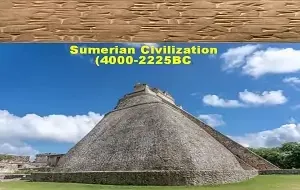Sumerian Civilization(4000-2225BC)
The Sumerian civilization is one
of the oldest civilizations in the world. The first people to settle in Mesopotamia
(Tigris and Euphrates) were the Sumerians. They were neither Aryan nor
Semitic, but a separate race. They descended from the mountains to the
northeast and settled on the banks of the Euphrates. Traces of the Samaritan
civilization show that it was a parallel civilization to the Egyptian and
Mozambican civilizations. This civilization is very similar to the Moin Judaro
civilization in particular.
Her profession:
This is because the people who settled
on the banks of the Euphrates initially made farming and fishing their
profession, but when their villages began to turn into cities and urban states
were established. The cities of Ar, Nairpur, and Edge became famous. The cities
that were first established here were in the lower part of the valley where the
Tigris and Euphrates flowed parallel and fell into the Persian Sea. Later
cities were established in the upper part of the valley. Thus, this part of
Mesopotamia was divided into upper and lower parts like Egypt.
System of Government: -
The Sumerian government was based
on religion. The kingdom belonged to the gods and the king was the incarnation
of these gods. Initially, the ruler of the city-state was a temple priest, and
later when he became a permanent ruler, his religious duties were as important as
his political duties. Due to the incarnation of these deities, their status in
life also became like that of the deities. He lived in palaces where there was
a strong guard and he rarely stayed out of the palace.
Conquered territories and cities were ruled
by kings or tribal chiefs appointed by kings who provided soldiers for the
king's army. These governors and nobles were overseen by the king himself. And
he also appointed officers who collected taxes, collected taxes in the form of
goods and kept them in royal warehouses. Thus the tax records on the clay
tablets were kept under the supervision of experienced clerks.
Thus the administration of the
government was carried out under the supervision of other officers and clerks
under the supervision of the king and his appointed governors and emperors. The
Sumerian government had the same characteristics as the Egyptian
government, but its civil war did not stabilize the system of government in the
ancient Egyptian state. Yet the powerful tactical king, who was also a
religious leader, sought to improve the country's administrative affairs and
appointed separate officers to oversee government affairs.
Trade and rules: ---
Initially, like the Egyptians, the Sumerians
adopted agriculture as a profession, but when villages were replaced by
cities and urban states, trade flourished in the country. And in a short time,
the Sumerian nation was considered a merchant nation. He established
trade relations with neighboring countries and West Asian countries. Along with
Semitic archeology, some cultural relics have been discovered in the Indus
Valley. They prove the trade and social ties between the two regions.
As trade transactions began to increase,
commodity prices began to be determined by the quantity of wheat or jockey, so
trade began to be disrupted. But gradually metals were used to exchange goods
and silver began to be exchanged. The amount of silver began to determine the
value of everything. And so trade became easier and trade flourished. Thus
began the accounting for trade.
As a trading nation, the Samaritans
enacted laws for social needs, including buying and selling, transactions and
loans, and later marriage and divorce, inheritance, and contracts. These laws
were compiled by the famous ruler of Babylon (Hammurabi) which is still
known today as the "Laws of Hammurabi".
Signs of the ancient Sumerian
civilization was found after the excavation of archeological sites in
present-day Iraq and Syria, which introduced the world to this civilization.
This current of civilization has been going on in this region for centuries and
its names are changing but it could not be reversed. Civilization and
government The government of religion, trade, science and art, economy and
continuity of war and bloodshed was changed by the people of Babylon and later
Assyria led civilization in this valley but the oldest civilization that
started ۔ That was the Semitic civilization.
Indus Valley Civilization is as yet a secret
The Great African civilizations




.jfif)


0 Comments